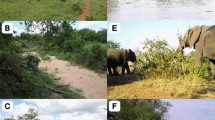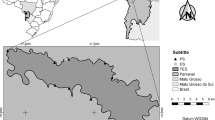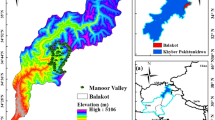Abstract
DURING 1960 and 1961 we studied periodically flooded wetlands dominated by the trees Larix laricina, Thuja occidentalis, and Ulmus americana along transects from lake margins to the upland in the Rideau Lakes Region of Ontario. This vegetation shows distinct belts of the dominants from the air which have often been described as separate plant communities and were interpreted as stages in a hydrosere1,2.
This is a preview of subscription content, access via your institution
Access options
Subscribe to this journal
Receive 51 print issues and online access
$199.00 per year
only $3.90 per issue
Buy this article
- Purchase on Springer Link
- Instant access to full article PDF
Prices may be subject to local taxes which are calculated during checkout
Similar content being viewed by others
References
Gates, F. C., Ecol. Monogr., 12, 213 (1942).
Conway, V. M., Ecol. Monogr., 19, 175 (1949).
Cottam, G., and Curtis, J. T., Ecology, 37, 451 (1956).
Curtis, J. T., and McIntosh, R. P., Ecology, 32, 476 (1951).
Dagnelie, P., Bull. Serv. Carte Phytogeogr., Ser. B, 5, 7 (1960).
Snedecor, G. W., Statistical Methods, fifth ed., 115 (Iowa State College Press, Ames, Iowa, 1956).
Author information
Authors and Affiliations
Rights and permissions
About this article
Cite this article
BESCHEL, R., WEBBER, P. Gradient Analysis in Swamp Forests. Nature 194, 207–209 (1962). https://doi.org/10.1038/194207a0
Issue Date:
DOI: https://doi.org/10.1038/194207a0
This article is cited by
-
On the nature of vegetation boundaries, undisturbed flood plain forest communities as an example — a contribution to the continuum/discontinuum controversy
Vegetatio (1992)
-
Changes in the composition, structure, and production of plant communities along a perturbed wetland coenocline
Vegetatio (1976)
-
On objectives of methods of ordination
Vegetatio (1975)
-
The continuum concept of vegetation
The Botanical Review (1967)
-
The continuum and the individualistic association
Vegetatio (1963)
Comments
By submitting a comment you agree to abide by our Terms and Community Guidelines. If you find something abusive or that does not comply with our terms or guidelines please flag it as inappropriate.



